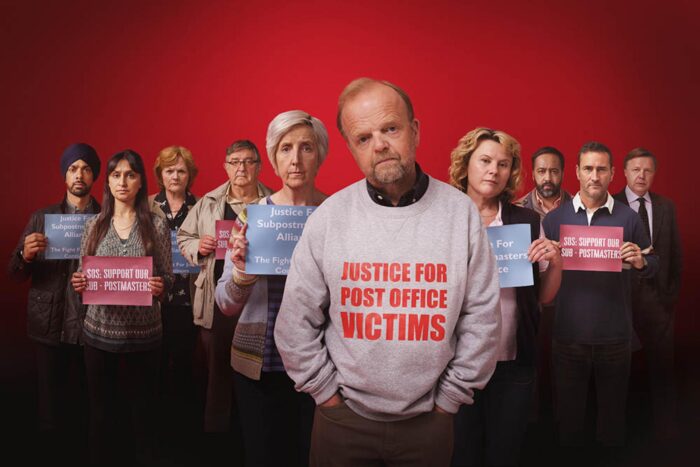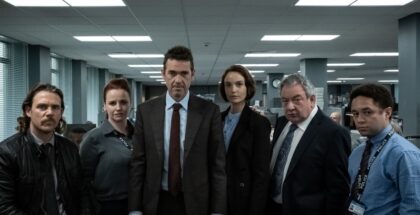True Crime Tuesdays: Mr Bates vs the Post Office
Review Overview
Stress
10Frustration
10Justice
7Helen Archer | On 09, Jan 2024
Who would have thought ITV’s new year true-life drama would be driving the news agenda with such ferocity that the UK’s top politicians would have no choice but to be seen taking urgent action? So perfectly does Mr Bates vs the Post Office capture not only what people are calling Britain’s biggest miscarriage of justice, but also some of the many lives destroyed by it, that the viewing public is demanding their restitution.
Directed by James Strong, and written by Gwyneth Hughes, the Ealing comedy-esque title and the somewhat old-fashioned, very British aesthetic belies a drama simmering with tension and anger. Its subject is, as the title suggests, the Post Office scandal, which saw 3,500 subpostmasters and mistresses wrongly accused of stealing money from their businesses, and 736 being prosecuted, thanks to issues with their new computer accounting system Horizon, owned by a company called Fujitsu.
Covering a timespan of over two decades, and involving thousands of people, it was never going to be easy to adapt into a four-part drama, and the sheer scale of the scandal is only really appreciated in the closing credits. But the decision to focus on just a few of the cases, spearheaded by Toby Jones as the eponymous Alan Bates – the driving force behind the solidarity movement of the wrongly accused, who took their former employer to task, against all odds – is a sound one, allowing the viewer to appreciate the devastation wreaked on individual lives. Casting low-key national treasures such as Jones, and Julie Hesmondhalgh as his wife Suzanne Sercombe, as the unified and unifying couple at the centre of it conveys a certain cosiness that is soon upturned by the horrors it relays.
The first episode is gut-wrenchingly tense, thanks in no small part to the story of Jo Hamilton (Monica Dolan) – like so many other subpostmasters and mistresses, she was an unassuming and much-loved pillar of the community, baking fresh scones to bring in to be sold at the coffee shop adjoining her place of work. Her confusion and stress as the Horizon system glitches and then glitches again, the financial shortfalls doubling each time, is internalised, as she blames herself and her lack of financial or computing expertise for the discrepancies. The stress is heightened in her ever-desperate phone calls to a ‘helpline’ that tells her not only that it is her fault, but, crucially, that no one else has reported the same problems. This, of course, would turn out to be a lie – and one of many.
This kind of psychological torture is repeated throughout the next episode, which details other cases: Lee Castleton (Will Mellor), who was pursued through the courts and went bankrupt when he was wrongly accused; Saman Kaur (Krupa Pattani), who suffered a complete mental breakdown and had to be hospitalised, where she was given electro-shock therapy in an effort to stabilise her; and Martin Griffiths (Colin Tierney), who took his own life when the Post Office came for him, after 20 years’ service with them.
The series segues from these stories to the way in which Bates forced a solidarity between the many cases, who had individually been told that they were the only ones suffering from the problem. Setting up meetings in small village halls in the middle of England, it turns into a movement, then a mass action, helped by independent investigator Bob Rutherford (Ian Hart) and Conservative MP James Arbuthnot (Alex Jennings).
And then there are the villains of the piece – Lia Williams plays Paula Vennells, CEO of the Post Office Ltd, and Katherine Kelly plays Angela Van Den Bogerd, whose various job titles at the Post Office during her 33 years of working there included Director of Support Services and People and Change Director. Other people at the top have been left out of the drama, whether for brevity or for legal or other reasons, but it doesn’t take much in the way of research to discover those involved in the tangled web of deceit at the heart of the organisation – as with those at the top of Fujitsu, it’s a veritable who’s who of politicians’ spouses and associates.
While what stays with you from the drama are the human stories of despair – the self-blame, alienation from the communities they served, the imprisonments, breakdowns, bankruptcies, suicides and lifelong trauma – what is coming out of the series is a very public acknowledgement, finally, of the ways in which these people have been abused. But offscreen, the hydra’s tentacles, reaching to the higher levels of society, are now in the spotlight, laying bare the fact that those responsible for so much sorrow shamelessly failed upwards into cushy jobs – even, in some instances, being given Honours by the state on the back of it. This drama ultimately lays bare the injustices ingrained in British society and is a testament to the power of TV.
















